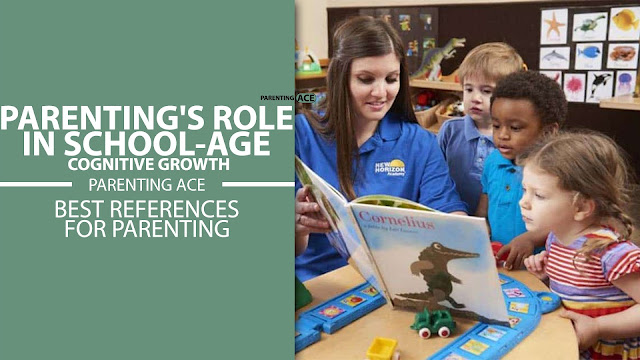The Role of Parenting in Fostering Children's Cognitive Growth During the School-Age Years
In the dynamic landscape of childhood development, the school-age years stand out as a pivotal phase marked by significant cognitive growth. As parents, our role transcends merely overseeing academic progress; we become architects of our children's intellectual journey. In this blog post, we delve into the crucial role of parenting in nurturing children's cognitive development during these formative years. From understanding the intricate interplay between parenting styles and cognitive growth to unveiling practical strategies for fostering curiosity and critical thinking, join us in exploring how parental guidance shapes the minds and futures of our school-age children.
 |
| Parenting's Role in School-Age Cognitive Growth |
As children enter the school-age years, typically ranging from around 6 to 12 years old, their cognitive development undergoes significant changes. This period is characterized by rapid cognitive growth, marked by advances in language, problem-solving abilities, and social cognition. While formal education plays a crucial role during this stage, the influence of parenting cannot be understated. In this article, we delve into the profound impact of parenting on children's cognitive growth during the school-age years, exploring key strategies and considerations for parents to optimize their child's development.
Understanding Cognitive Development During the School-Age Years
During the school-age years, children's cognitive abilities expand dramatically. They become increasingly proficient in language and communication, develop more sophisticated problem-solving skills, and gain a deeper understanding of abstract concepts. Piaget's theory of cognitive development highlights this period as the stage of concrete operations, during which children begin to think logically about concrete events and objects. Additionally, their social cognition blossoms as they navigate complex social interactions and understand others' perspectives.
The Influence of Parenting Styles
Parenting styles significantly impact children's cognitive development during the school-age years. Research has identified authoritative parenting as particularly beneficial for fostering cognitive growth. Authoritative parents provide warmth, support, and guidance while also setting clear expectations and boundaries. This style of parenting promotes autonomy and critical thinking skills, enabling children to explore and learn in a safe and nurturing environment. In contrast, authoritarian parenting, marked by strict control and lack of warmth, may hinder cognitive development by stifling curiosity and independent thinking.
Promoting Cognitive Growth Through Positive Parenting Practices
- Encourage Exploration and Curiosity: Parents can foster cognitive growth by encouraging children to explore their interests and ask questions. Providing opportunities for hands-on learning experiences and engaging in meaningful discussions can spark curiosity and critical thinking.
- Support Academic Achievement: Parents play a crucial role in supporting children's academic success. This involves creating a conducive home environment for learning, assisting with homework when needed, and advocating for their educational needs.
- 3. Stimulate Intellectual Stimulation: Engaging children in intellectually stimulating activities, such as reading together, solving puzzles, or participating in educational games, can enhance cognitive development and stimulate their curiosity.
- Promote Problem-Solving Skills: Encouraging children to tackle challenges independently and offering guidance when needed helps develop their problem-solving abilities and resilience.
- Model Lifelong Learning: Parents serve as powerful role models for their children. Demonstrating a positive attitude towards learning, seeking out new knowledge, and embracing challenges can inspire children to adopt a growth mindset and pursue lifelong learning.
The school-age years are a critical period for children's cognitive development, and parenting plays a central role in shaping their intellectual growth. By adopting authoritative parenting practices that prioritize warmth, support, and autonomy, parents can create a nurturing environment that fosters curiosity, critical thinking, and academic achievement. By understanding the profound influence of parenting on children's cognitive development and implementing effective strategies, parents can empower their children to reach their full potential and thrive academically and intellectually.




